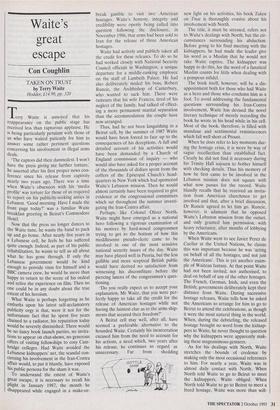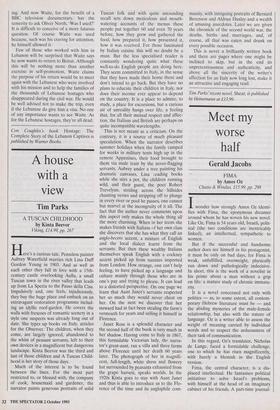Waite's great escape
Con Coughlin
TAKEN ON TRUST by Terry Waite hrodder, .f14.99, pp. 320 Terry Waite is annoyed that his reappearance on the public stage has received less than rapturous applause. He is being particularly petulant with those of us who have waited patiently for him to answer some rather pertinent questions concerning his involvement in illegal arms deals.
The captors did their damnedest. I won't have the press giving me further torture,' he asserted after his first proper news con- ference since his release from captivity nearly two years ago. There was a time when Waite's obsession with his 'media profile' was torture for those of us required to report on his publicity-seeking antics in Lebanon. 'Good morning. Have I made the front page today?' was a familiar Waite breakfast greeting in Beirut's Commodore Hotel.
Now that the press no longer dances to the Waite tune, he wants the band to pack up and go home. After nearly five years in a Lebanese cell, he feels he has suffered quite enough. Indeed, as part of his public rehabilitation, he wants to tell us all about What he has gone through. If only the Lebanese government would be kind enough to provide visas for himself and a BBC camera crew, he would be more than happy to return to the scene of his ordeal and relive the experience on film. Then no one could be in any doubt about the true extent of his heroism.
What Waite is perhaps forgetting as he embarks upon his latest self-acclamatory Publicity orgy is that, were it not for the unfortunate fact that he spent five years chained to a radiator, his reputation today would be severely diminished. There would be no fancy book launch parties, no invita- tions to appear on chat-shows, no generous offers of visiting fellowships to cosy Cam- bridge colleges. Had Waite avoided the Lebanese kidnappers' net, the scandal con- cerning his involvement in the Iran-Contra affair would, to put it bluntly, have exposed his public persona for the sham it was.
To understand the extent of Waite's great escape, it is necessary to recall his Plight in January 1987, the month he disappeared while engaged in a make-or-
break gamble to visit two American hostages. Waite's honesty, integrity and credibility were openly being called into question following the disclosure, in November 1986, that arms had been sold to Iran for the release of three American hostages.
Waite had actively and publicly taken all the credit for these releases. To do so he had worked closely with National Security Council officials in Washington, a unique departure for a middle-ranking employee on the staff of Lambeth Palace. He had also deliberately misled his boss, Robert Runcie, the Archbishop of Canterbury, who wanted to sack him. There were rumours that his wife Frances, tired of his neglect of the family, had talked of effect- ing a more permanent marital separation than the accommodation the couple have now arranged. Thus, had he not been languishing in a Beirut cell, by the summer of 1987 Waite would have been forced to face up to the consequences of his deceptions. A full and detailed account of his activities would have been demanded by a Church of England commission of inquiry — who would also have asked for a proper account of the thousands of dollars spent from the coffers of the Episcopal Church's head- quarters in New York which had sponsored Waite's Lebanon mission. Then he would almost certainly have been required to give evidence at the congressional committees which sat throughout the summer investi- gating the Iran-Contra affair. Perhaps, like Colonel Oliver North, Waite might have emerged as a national hero following a rigorous examination of his motives by hard-nosed congressmen trying to get to the bottom of how this meddlesome pseudo-cleric came to be involved in one of the most sensitive national security issues of the day. Waite may have played well in Peoria, but the less gullible and more sceptical British public would have derived no satisfaction from witnessing his discomfiture before the piercing lances of the congressmen's ques- tioning. 'Do you really expect us to accept your explanation, Mr Waite, that you were per- fectly happy to take all the credit for the release of American hostages while not having the faintest clue as to the arms ship- ments that secured their freedom?'
A Beirut cell may well, after all, have seemed a preferable alternative to the hounded Waite. Certainly his incarceration excused him from the need to account for his actions, a need which, two years after his release, he continues to regard as unnecessary. Far from shedding
new light on his activities, his book Taken on Trust is thoroughly evasive about his involvement with North.
The title, it must be stressed, refers not to Waite's dealings with North, but the cir- cumstances surrounding his abduction. Before going to his final meeting with the kidnappers, he had made the leader give his word as a Muslim that he would not take Waite captive. The kidnapper was happy to do this, for the word of a fanatical Muslim counts for little when dealing with a pompous infidel.
The book itself, however, will be a dis- appointment both for those who hail Waite as a hero and those who condemn him as a fool. To avoid addressing the fundamental questions surrounding his Iran-Contra involvement, Waite has devised the novel literary technique of merely recording the book he wrote in his head while in his cell. Most of the book, therefore, is filled with mundane and sentimental reminiscences which fall well short of Proust.
When he does refer to key moments dur- ing the hostage crisis, it is more by way of vague recollection than established fact. Clearly he did not find it necessary during his Trinity Hall sojourn to bother himself with checking details. Thus his memory of how he first came to be involved in the Lebanon mission does not square with what now passes for the record. Waite blandly recalls that he received an invita- tion from American churchmen to get involved and that, after a brief discussion, Dr Runcie agreed to let him go. Runcie, however, is adamant that he opposed Waite's Lebanon mission from the outset, and only granted him permission, with heavy reluctance, after months of lobbying by the Americans.
When Waite went to see Javier Perez de Cuellar at the United Nations, he claims this was important because he was 'acting on behalf of all the hostages, and not just the Americans'. This is yet another exam- ple of Waitean fantasy. At that point Waite had not been invited, nor authorised, to deal on behalf of any of the other hostages. The French, German, Irish, and even the British, governments deliberately kept their distance from Waite. During successive hostage releases, Waite tells how he asked the Americans to arrange for him to go to Beirut to attend the celebrations, as though it were the most natural thing in the world. When, during the debriefing, the released hostage brought no word from the kidnap- pers to Waite, he never thought to question why the kidnappers were apparently mak- ing these magnanimous gestures.
As for his dealings with North, Waite stretches the bounds of credence by making only the most occasional references to him. For nearly a year, Waite was in almost daily contact with North. When North told Waite to go to Beirut to meet the kidnappers, Waite obliged. When North told Waite to go to Beirut to meet a freed hostage, Waite was more than will- ing. And now Waite, for the benefit of a BBC television documentary, has the temerity to ask Oliver North, 'Was I used?' It is difficult to conceive of a more fatuous question. Of course Waite was used because, such was his craving for attention, he himself allowed it.
Few of those who worked with him in Lebanon will be surprised that Waite says he now wants to return to Beirut. Although this will be nothing more than another exercise in self-promotion, Waite claims the purpose of his return would be to meet again with the Lebanese who were involved with his mission and to help the families of the thousands of Lebanese hostages who disappeared during the civil war. He would be well advised not to make the trip, even if the Lebanese do give him a visa. No one of any importance wants to see Waite. As for the Lebanese hostages, they're all dead.
Con Coughlin's book Hostage: The Complete Story of the Lebanon Captives is published by Warner Books.



















































 Previous page
Previous page